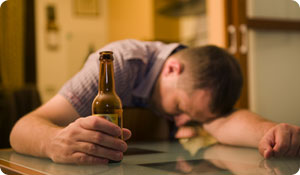
You love having a glass of wine at dinner or kicking back with a beer while watching TV at night. Lately, though, that one glass is becoming two, and the beer tastes so good it's hard to stop at one. Is there any way to know whether the alcoholic beverage you enjoy every night is a problem? Could you be gradually drifting over the line between enjoyment and abuse where alcohol is concerned?
Alcohol use disorders are bona fide medical conditions. It's estimated that some 18 million individuals in the U.S. have an alcohol use disorder--either alcohol dependence (alcoholism) or alcohol abuse. Alcoholism is more serious. It can include symptoms like cravings, physical dependence, and tolerance, meaning the person needs more and more alcohol. Alcohol abusers may not be physically dependent on alcohol, but they still have a significant disorder.
"We have been moving away from using the terms 'alcohol abuse' and 'alcohol dependence,' and putting the emphasis on risky drinking, prevention, and early intervention," says Bruce Goldman, LCSW, CASAC, director of Substance Abuse Services at Zucker Hillside Hospital in Queens, part of the North Shore/LIJ Health System. "We want to help people be more aware of how they use alcohol."
Wondering if your drinking is a problem? Here are some signs to look for.
1. If you are a man and drinking more than four drinks per day or 14 drinks per week, you're at risk for alcohol abuse. A woman who has more than seven drinks per week is at risk, says Goldman.
2. If you're an underage drinker, you're at risk for alcohol abuse later on. "The younger you are when you start drinking, the more likely you will have a problem with drinking later in life," Goldman says.
3. If you are jeopardizing your mental or physical health, or your job or family, you've got a problem, says Tina B Tessina, Ph.D., author of "Money, Sex and Kids: Stop Fighting about the Three Things That Can Ruin Your Marriage." It can be tough to admit this, however. And, Tessina adds, "There is no blood test to determine whether someone is addicted to alcohol."
4. If you are seeing yourself drink more and more, this can be a sign of alcohol abuse, says Merrill Herman, MD, associate clinical professor of psychiatry at Albert Einstein/Montefiore Medical Center in New York City.
5. "If you are feeling guilty about your drinking and annoyed when people bring it up to you, it's time to take a look at your alcohol consumption," Herman says.
6. If you wake up the morning feeling hung over, and feel like you need a drink to calm down, that is a problem.
7. If you are unable to cut down on your alcohol use or you find that your activities are curtailed due to drinking, you should seek help.
8. If your drinking starts to adversely affect your marriage, it's time to take stock and think about getting help.
9. Finally, if a person is not just drinking in a social situation but drinking by himself more and more, that's not good. "If you drink to relax and can't relax otherwise, that is a problem," Herman says.
Source:
"Alcohol use disorders." National Institute on Alcohol Abuse and Alcoholism.
http://www.niaaa.nih.gov/alcohol-health/overview-alcohol-consumption/alcohol-use-disorders





